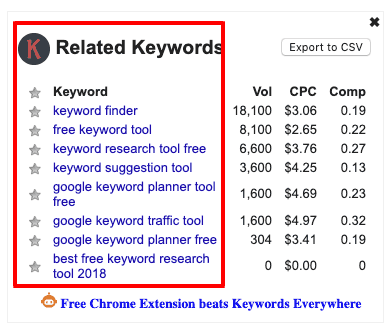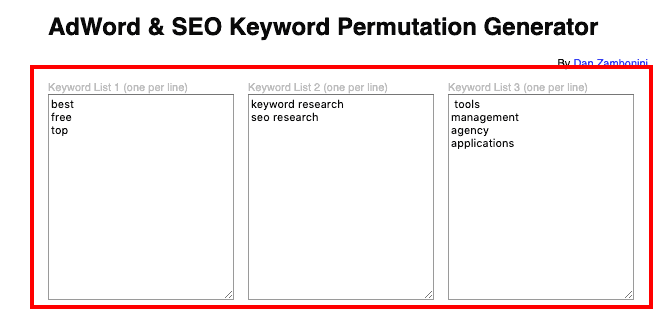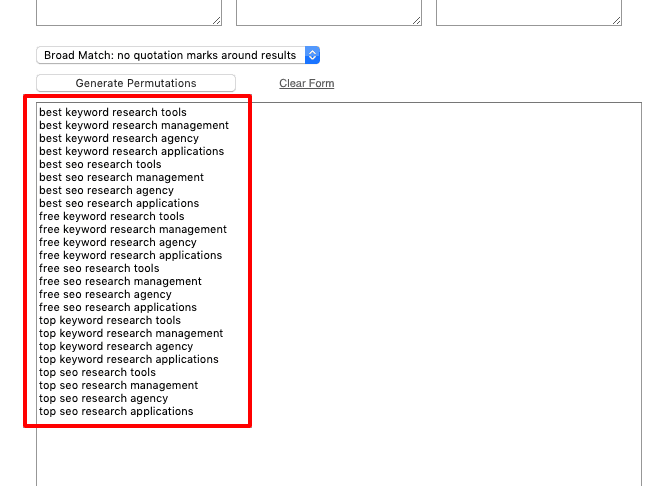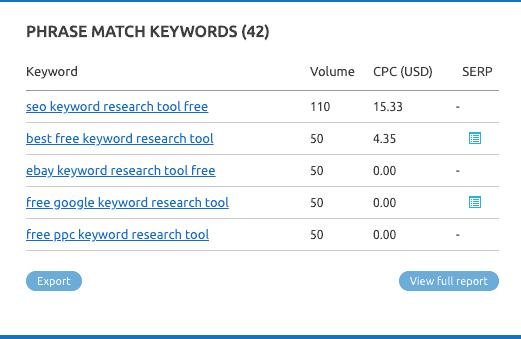Keyword research is essential to your SEO strategy. However, working with the paid tools can get a bit pricey and it can be hard to justify the costs. Luckily, paid keyword research tools aren’t your only option. There are tons of top quality, free tools out there to help you get a jump on your SEO.
The Top Free Keyword Research Tools for Your SEO Strategy
1. Keywords Everywhere
If you’re new to the SEO game, Keywords Everywhere is a great starting kit. With Keywords Everywhere you are able to assess your keyword’s search volume, cost per click and competition data.

Using this tool, you will have all the information laid out in front of you. It even generates a list of related keywords for you to consider. This feature is particularly handy as it gives you an idea of what your audience could be potentially searching for.

Pros:
- Easy to use
- You can export results as a CSV file
- People also search for feature
Cons:
- Can’t specify the location to see how keywords are performing in your area
- Only available as a Chrome or Firefox extension
2. Google Keyword Planner
A long-standing favourite to many is the Google Keyword Planner. The clear and concise layout makes it easy for anyone to use regardless of SEO experience levels.
With the Google Keyword Planner, you are able to generate a list of keywords and their search volume data. If you’re planning on use AdWords for your website, this tool is particularly handy as it generates the suggested bid for you. Other features include monthly search volumes and competitive rates.
While the tool doesn’t offer any fancy add-ons, that doesn’t mean that it won’t get the job done. It gets you your keyword data straight from the source and that’s what really counts!
Pros:
- Data straight from Google
- Clear layout
- Adaptable to your campaign’s needs
Cons:
- A Google Ads account is needed to use the tool
3. AdWord & SEO Keyword Permutation Generator
If you’re struggling to discover new keywords for your content, you will love the AdWord & SEO Keyword Permutation Generator. This tool takes into consideration each of your keywords and arranges them into relevant topics.
Here’s how it works:
- Take your keyword or key phrase and input them into the 3 different lists

- Select “Generate Permutations”
- Sit back and watch the results flood in
Pro tip: the more keywords you input, the more results it will generate.
4. Soovle
If you struggle with coming up with snappy captions for your keyword content, you will love Soolve. This tool acts like the Google autocomplete suggestion finder to help you find the best content for your keyword. You can use it for Google suggestions, Yahoo, Bing, YouTube, Wikipedia and Amazon.
The straightforward design only requires you to input your main keyword. From there, it will generate lists of suggestions based on each search platform. It will also tell you the search volume, cost per click, and competitive rates.

Pros:
- Quick and efficient to use
- Provides search results
- Help generate ideas for content
- Multiple search platforms included
Cons:
- You are unable to specify the keywords by your location
5. Wordtracker Scout
While generating a cohesive and effective list of keywords is vital to SEO, it’s not the only aspect you should be worrying about. In fact, a large part of your SEO keyword research should be analysing what your competitors do. That’s where Wordtracker Scout comes in.
Wordtracker Scout, an umbrella application under Wordtracker, allows you to uncover the true keywords that attract your audience. Available as a Chrome download, you can visit any website and determine which keywords they’re trying to rank for. The Chrome extension will generate a summary of insights and keywords for that page.
Pros:
- Easy to use
- Competitor insights
Cons:
- Only available for Chrome
6. Keyword Sh*tter
Generating new and fresh ideas for your keyword content can be tough. Especially when that writer’s block kicks in! Luckily, Keyword Sh*tter is here to help. All you need to do is input your seed keyword and press “shit keyword!” to generate a bulk keyword mine. As an added feature, you can filter your search terms by “positive” and “negative”.
For example, let’s put our seed keyword as “keyword research tools”. Then we’d input “free” as our positive filter.

As you can see, the results are only mining-related keywords with free in them.
On the other hand, the “negative” filter does the exact opposite. By inputting your negative filter, you are telling the tool to not include suggestions with that word in them.
This nifty tool is great for content generation. However, we do want to warn you that it can become quite an extensive list.
Pros:
- Customisable searches
- Extensive results
- Provides keyword data
Cons:
- Not specific to your location
7. SEMRush
We’ve saved the best for last - SEMRush is a top contender for those who aren’t looking to do massive keyword mines.
Enjoy all of the features that you’d expect from a paid research tool for free! The only catch is that you have to register and there are only 10 searches available per day. However, you do get to utilise the full range of SEO tools.
These tools are great for content and competitor research. SEMRush allows you to search either by domain or keyword. Based on your input, it will generate results for the keyword analytics, marketing insights, domain analytics and much more. You can even make use of the SEO Writing Assistant.


Pros:
- Accurate results
- Extensive analytics
- Full range of features
Cons:
- Only allowed 10 searches per day
- Have to register for the services
There is a lot to be said about free keyword research tools! They save you time from mining appropriate keywords on Google and save you money from expensive platforms. However, paid tools do contain huge amounts of data and could be worth considering if you were to grow your SEO strategy.


